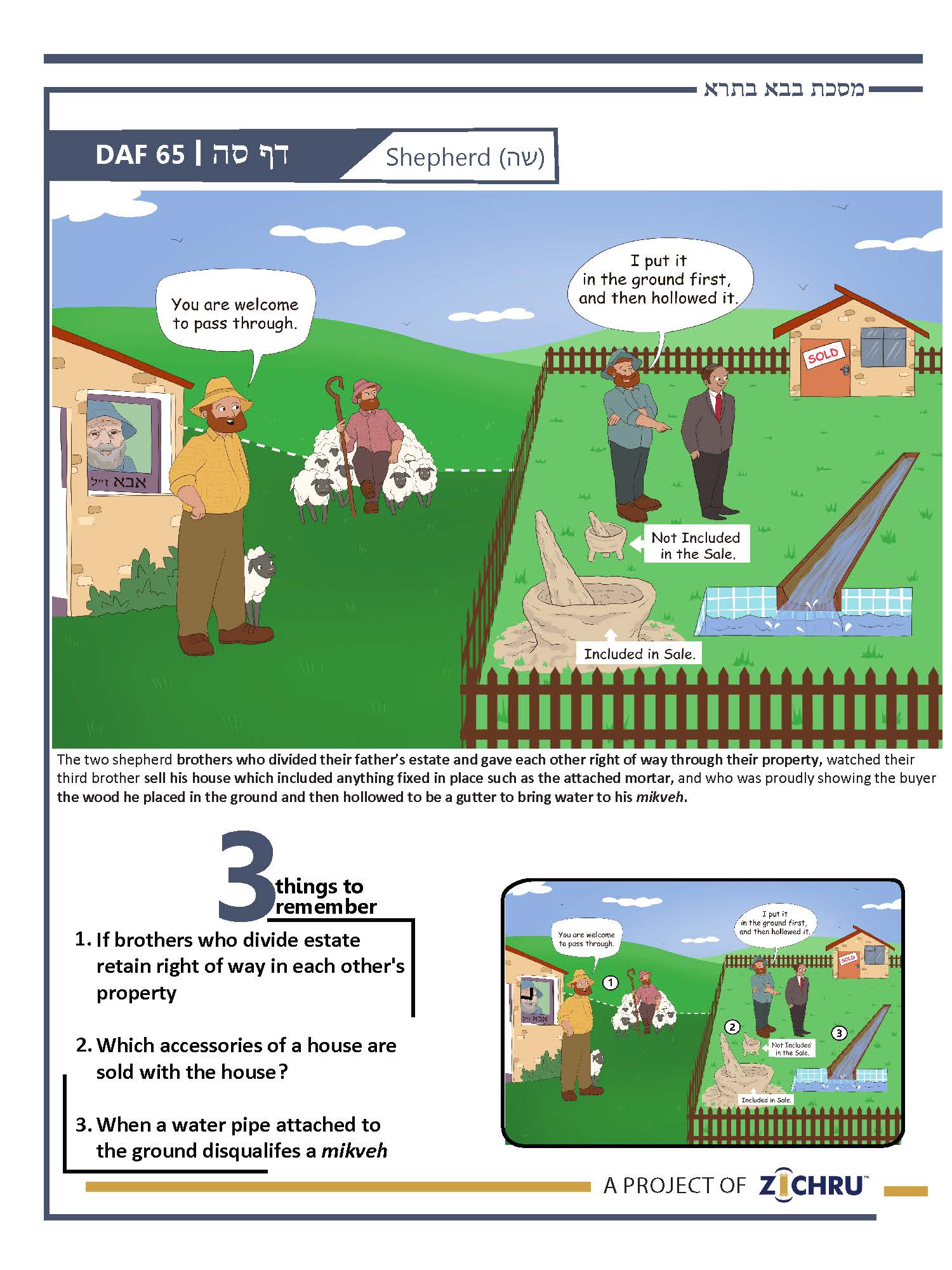Bava Basra - Daf 65
- Audio Timestamps
0:00 - The 3 Sugyos
2:56 - Review of 3 Sugyos
5:45- Siman
8:29 - 4 Blatt Back Chazarah
16:23 - Pop Quiz (Last 7 blatt)
For access to all Zichru resources including PDFs, and illustrations CLICK HERE
- If אחין שחלקו retain a right-of-way in each other’s property
Rav says the halachah follows the Chochomim, that מוכר בעין רעה מוכר. Shmuel says the halachah follows Rebbe Akiva, that מוכר בעין יפה מוכר. Ravina asked Rav Ashi if they repeated this machlokes elsewhere, because Shmuel said: האחין שחלקו – regarding brothers who divided an estate, אין להן לא דרך זה על זה – they do not have a right-of-way in each other’s property, nor other rights, such as for ladders, windows, and irrigation streams. Rav says: יש להן – [the brothers] do have all these rights. Apparently, they argue if the brothers, who sold their rights in each other’s portions, sell בעין יפה (and do not retain a דרך, etc.), or בעין רעה. Rav Ashi explains that if we only had this second argument, one could think that Rav’s reason that a brother keeps these rights is because he can say: בעינא למידר ביה כי היכי דדרו ביה אבהתי – “I want to live in it the way my fathers did,” i.e., with his full rights. This argument is supported by a passuk: "תחת אבותיך יהיו בניך" – your sons will be in your fathers’ place. Otherwise, Rav may hold מוכר בעין יפה מוכר. Conversely, the second argument is necessary to teach that Shmuel does not agree with Rav there.
- Which accessories of a house are sold with the house
The next Mishnah lists which accessories are sold together with a house. The Rashbam explains that the general principle is that anything permanently fixed in place is sold with the house; anything movable is not. The Mishnah states: המוכר את הבית מכר את הדלת אבל לא את המפתח – one who sells a house automatically sold the door, but not the key. The door is permanently attached, but the key is movable. Similarly, a מכתשת קבועה – attached mortar is sold with the house, but not a movable mortar. If the seller says: הוא וכל מה שבתוכו – “I am selling [the house] and everything in it,” then all these items are sold. In a Baraisa, the Tanna Kamma partially disagrees: מכר את המכתשת החקוקה – he sold the mortar which was chiseled out of something already attached to the ground, אבל לא את הקבועה – but not the [mortar] which was chiseled out of a detached material and then attached to the ground. Rebbe Eliezer says: כל המחובר לקרקע הרי הוא כקרקע – anything attached to the ground is like the ground, even if it was chiseled out first, and included in the sale. Our Mishnah reflects Rebbe Eliezer’s view.
- When a צינור attached to the ground disqualifies a mikveh
In a Baraisa it was taught: צינור שחקקו ולבסוף קבעו – a water pipe which was hollowed out and then attached to the ground, פוסל את המקוה – water which flows though it disqualifies a mikveh, because the pipe is considered a כלי. קבעו ולבסוף חקקו – If it was first attached to the ground and then hollowed out, אינו פוסל את המקוה – the water does not disqualify the mikveh, because the pipe is considered part of the ground, and the hollowing out is considered a mere ditch in the ground. The Gemara says this Baraisa does not agree with Rebbe Eliezer, nor the Rabbonon who disagree with him. In seeking to identify which opinions of theirs are incompatible with this Baraisa the Gemara initially suggests Rebbe Eliezer’s opinion above, that anything attached to the ground is sold with the house, even it was chiseled out after being attached. However, the Gemara responds that this position may be because he holds מוכר בעין יפה מוכר, not because he considers it part of the ground.
Siman – Sheep (Shepherd)
The two shepherd brothers who divided their father’s estate and gave each other right of way through their property, watched their third brother sell his house which included anything fixed in place such as the attached mortar, not the detached one, and who was proudly showing the buyer the wood he placed in the ground and then hollowed to be a gutter to bring water to his mikveh.


